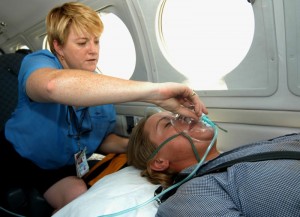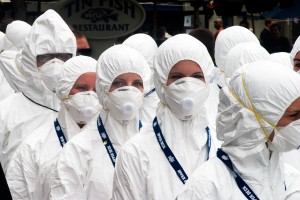Beauchamp and Childress’s preliminary discussion of beneficence distinguished between general and specific beneficence as well as the nature of role obligation and special relations. I found the example of the physician-stranger relationship to be a very interesting intersection among these distinctions. A doctor at the scene of an emergency represents, “a gray area between a role-specific obligation and a non-role specific obligation” (Beauchamp and Childress 206). A doctor inhabits a specific role, entailed by his or her special training and knowledge, but whether or not his or her beneficence is due to the general population or only to specific patients is a valid question. From the discussions of beneficence as well as discussions about the nature of physicians involved with in-flight emergencies, I maintain that the nature of the definition of beneficence makes it morally obligatory for a physician to take action in an emergency situation, even among strangers.
 At stake here is Beauchamp and Childress’s position that a physician stranger is not, “morally required to assume the same level of commitment and risk that a prior contractual relationship with a patient or hospital would morally require” (206). This takes into account risk, which of course, a doctor may take into account both in an emergency situation as well as when caring for highly abusive or contagious patients. However, I think that doctors occupy a highly specialized role which brings with it a moral obligation to care for all people needing immediate care. This is echoed by the Hippocratic Oath, which posits that, “a doctor has a special obligation to all human beings” (Sheperd http://www.ncbi.nlm.nih.gov/pmc/articles/PMC1676316/). Especially in cases in which a doctor is the solitary medical caregiver during an in-flight emergency, there are few to no risks posed to the doctor’s well-being as long as he or she acts within the limits of, “ their qualifications and experience,” and ensures, “ consent and documentation” ( Sheperd). I think these provisions are relatively basic and demonstrate that a doctor’s role-specific obligation of acting beneficently is preserved at all times in an in-flight emergency scenario.
At stake here is Beauchamp and Childress’s position that a physician stranger is not, “morally required to assume the same level of commitment and risk that a prior contractual relationship with a patient or hospital would morally require” (206). This takes into account risk, which of course, a doctor may take into account both in an emergency situation as well as when caring for highly abusive or contagious patients. However, I think that doctors occupy a highly specialized role which brings with it a moral obligation to care for all people needing immediate care. This is echoed by the Hippocratic Oath, which posits that, “a doctor has a special obligation to all human beings” (Sheperd http://www.ncbi.nlm.nih.gov/pmc/articles/PMC1676316/). Especially in cases in which a doctor is the solitary medical caregiver during an in-flight emergency, there are few to no risks posed to the doctor’s well-being as long as he or she acts within the limits of, “ their qualifications and experience,” and ensures, “ consent and documentation” ( Sheperd). I think these provisions are relatively basic and demonstrate that a doctor’s role-specific obligation of acting beneficently is preserved at all times in an in-flight emergency scenario.
Five conditions were presented by Beauchamp and Childress in justifying whether or not a person X is obligated to rescue person Y. The condition most at stake in physician-stranger scenarios is condition 4, “X’s action would not present very significant risks, costs, or burdens to X” (202). Of course, there are emergency scenarios in which a physician would have to put his or herself at bodily risk in order to assist a stranger. However, even in a specific hospital setting, dangerous situations would require that health care professionals evaluate their course of action. In a hospital setting, it has been argued by Clark that the moral principle of beneficence and utility dictates that a physician assist despite risks since, “ training not only increases the value of the aid, it may also reduce the risk associated with providing it”(Huberhttp://www.tandfonline.com/doi/pdf/10.1162/152651604773067497 ). Since this argument can be made to justify involvement even in potentially dangerous, formal patient-physician relationships, it can also be applied in emergency situations.
or not a person X is obligated to rescue person Y. The condition most at stake in physician-stranger scenarios is condition 4, “X’s action would not present very significant risks, costs, or burdens to X” (202). Of course, there are emergency scenarios in which a physician would have to put his or herself at bodily risk in order to assist a stranger. However, even in a specific hospital setting, dangerous situations would require that health care professionals evaluate their course of action. In a hospital setting, it has been argued by Clark that the moral principle of beneficence and utility dictates that a physician assist despite risks since, “ training not only increases the value of the aid, it may also reduce the risk associated with providing it”(Huberhttp://www.tandfonline.com/doi/pdf/10.1162/152651604773067497 ). Since this argument can be made to justify involvement even in potentially dangerous, formal patient-physician relationships, it can also be applied in emergency situations.
Overall, the Hippocratic Oath, the example of an in-flight emergency scenario, and the argument by Clark that physicians are the least likely to be affected by risks of helping since they are indeed so highly qualified leads me to conclude that physicians are morally obligated to help all patients in all scenarios. Thus, the general versus specific moral obligation of beneficence does not apply to physicians in almost all cases.
Beauchamp, Tom L, and James F. Childress. Principles of Biomedical Ethics. New York: Oxford University Press, 2009. Print.
Huber, Samuel & Matthew K. Wynia (2004) When Pestilence Prevails…Physician Responsibilities in Epidemics, The American Journal of Bioethics, 4:1, 5-11, DOI:10.1162/152651604773067497
http://www.tandfonline.com/doi/pdf/10.1162/152651604773067497
Shepherd, B, D Macpherson, and C M B Edwards. “In-Flight Emergencies: Playing The Good Samaritan.” Journal of the Royal Society of Medicine 99.12 (2006): 628–631. Print.
http://www.ncbi.nlm.nih.gov/pmc/articles/PMC1676316/
Let me start off by saying that I like this post a lot, and think you make some great points. Your final concluding point that physicians are morally obligated to help all patients in all scenarios however definitely has the potential to elicit a slippery slope argument. For example we have seen this semester, in Amelda’s case and others, that there are times when doctors need to balance between patients. There are scenarios where to help one patient, would harm many others. Is the doctor then expected to take a utilitarian approach, or simply abide by the guideline to help anyone in need? And what if following the Hippocratic Oath of helping a patient to the best of ones abilities, would lead to a doctor unable to offer the best of his abilities to another patient?
While on the discussion of the hippocratic oath, I feel like a hot topic for debate would also be abortion, considering it is a clear violation. “I will give no deadly medicine to any one if asked, nor suggest any such counsel; and in like manner I will not give to a woman a pessary to procure an abortion.” So what has changed about our medical definition of abortion that has caused such a shift in view since the days of Hippocrates? And furthermore, as of now euthanasia is illegal in the US, but Physician Aided Death is legal in 4 states. No doubt this also violates the hypocratic oath, so my final question is if it is time for us to revamp the oath we make all doctors take, or do we instead just need to find new ways to justify our changing views in order to be in congruence with the oath that still stands?
Works Cited:
“Hippocratic Oath.” MedicineNet. N.p., 28 Aug. 2013. Web. 11 Feb. 2015.
“State-by-State Guide to Physician-Assisted Suicide – Euthanasia – ProCon.org.” ProConorg Headlines. N.p., n.d. Web. 11 Feb. 2015.
I do agree with you that Suranjana’s final statement that physicians are required to help ALL patients in ALL scenarios does provoke a slippery slope. While I completely agree with the argument above that physicians do have not only a moral obligation but a professional obligation to help anyone they can if they see someone in need – but as mentioned, they will only be able to help within their abilities. That being said, I do believe that a physician should at least try to help every person, stranger or not, in need of medical care especially if their condition is life-threatening, but just because they try doesn’t mean they can and will always succeed, but as long as they try to the best of their ability I believe they are fulfilling their moral and professional obligation as a doctor.
On the other hand, I don’t believe that your arguments of abortion and physician-assisted suicide are entirely in line with the main point of this post. The Hippocratic Oath was only 1 of 3 arguments made in support of Suranjana’s concluding argument, and I think that going down the road of abortion and euthanasia are unnecessary when dealing with the main question this post answers – how gray is the patient-stranger relationship? Ultimately this question isn’t addressing topics like those, but rather if a physician sees a stranger in need, are they morally obliged to give as much assistance as they can? And to that question my answer is yes.
Hey, Suranjana. Thank you for your post, for I enjoyed reading about the “gray area” in the patient-stranger relationship. However, I agree with the comments’ critiques of your concluding statement. As we have discussed in class, off-duty physicians ought to consider the potential harm to their families from death in trying to save the stranger in an emergency situation. More importantly, however, physicians ought not to intervene on all occasions because of different levels of preparation. For example, if a physician does not have the supplies to stabilize a person’s head, which could cause additional harm in the form of paralyzation, then he or she should not interact with the stranger; he or she ought to call for help, however. Since you based your argument for intervention on the Hippocratic Oath, the dilemma questions the professional obligations of the physicians. For comparison, one can analyze the professional or moral obligations of a police officer. For instance, if the officer witnessed a gun fight but does not have his or her gun, then he or she should not try to break up the fight. More harm will probably result rather than beneficence. Thus, one should take a lack of preparation into consideration when analyzing the moral obligations of professionals.
This post really stood out to me as this past week my father returned from a medical conference in Florida and coincidentally had to resuscitate the 69 year-old woman sitting next to him who had a vasovagal response after a quick ascend. Although my father had absolutely no relation to the woman, he felt a moral and professional obligation to help her as he had the background and knowledge. Even further, after springing into action, the man sitting behind my father who happened to be a respiratory tech also sprung into action – further demonstrating how real such a “foreign” situation may seem. Upon asking my father his thoughts on the situation, I quickly realized that his internal contemplation, of balancing the risk of the situation and the obligation to save this woman’s life, was one he made quickly and efficiently. Just as Suranjana mentions in her post, I believe that the moral principles of beneficence and utility led my father to assist despite the risks. Furthermore, I cannot imagine a situation in which my father wouldn’t help someone in such a situation so I have to agree with Suranjana’s conclusion that physicians are morally obligated to help all patients in all scenarios.